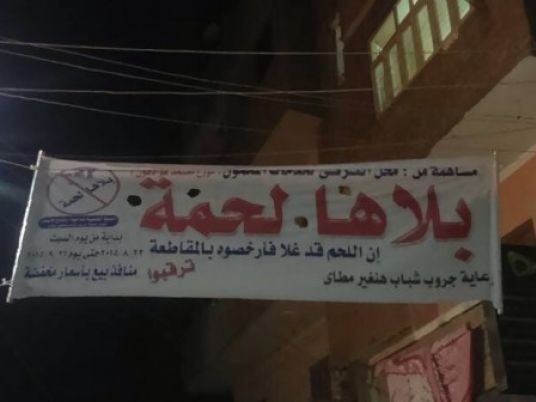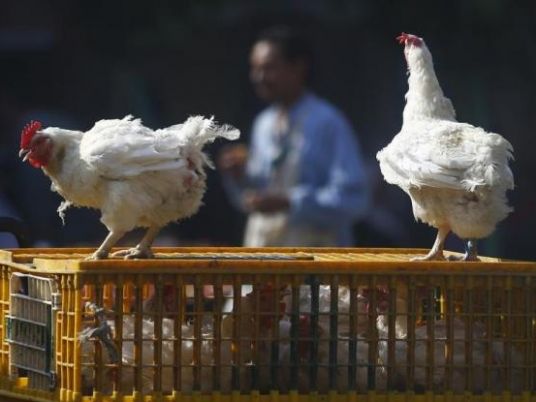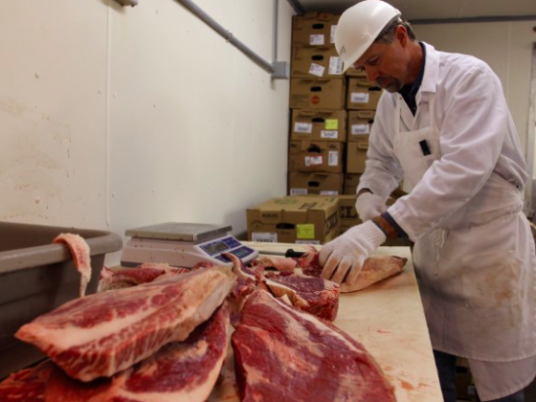
“Crazy tomato” is a common expression among Egyptians because tomato prices often skyrocket, but these days local meat is clearly "crazier", with unprecedented increases in prices ranging from LE80 to LE100 per kilo.
Local meat prices have gone up since the holy month of Ramadan by LE10 Mohammed Sharaf, head deputy of the butchers department of the Cairo Commerce Chamber, told CNN.
Accordingly, a group of social media youth kicked off nation-wide campaigns entitled, including others, “No more meat”, " Boycott meat" and "No for meat", encouraging people to boycott local meat to protest the astronomical increase in prices. The campaigns' main aim is to pressure butchers to reduce the cost of meat to LE50 per kilo.
The campaigns immediately caught the eye of people throughout the country. In Damietta, people decided to boycott meat anywhere between 15 days and a month to protest what they consider is the butchers' greed. Meanwhile, in Suez, a similar campaign has placed various posters throughout the city, encouraging citizens to stop meat purchases.
In Qena and Nagaa Hammadi a campaign entitled “No for meat” was started to boycott local meat for one month.The campaign’s founder, Amin Al-Fouly, said the move aims to lighten the burden on citizens while placing pressure on butchers to sell local meat at the “official pricing” set by the Supply and Internal Trading Ministry, which dictates meat should cost LE65 per kilo.
“We do not raise the prices by ourselves, we purchase very expensive calves from farms, which have recently sold for LE12,000 instead of LE10,000, so we are forced to raise the prices,” said a butcher from Nagaa Hammadi in a video posted on the “No more meat” official Facebook page.
In Minya, a campaign entitled “All of us are poor” called on citizens to shun local meat, which has risen to LE85 per kilo, in favor of fish, which is sold for LE20.
Moreover, in Sohag, meat prices reached LE80, pushing locals to stop buying it over the past week. “The idea of the campaign came about after the increase in meat prices which have jumped suddenly from LE65 to LE90, which is not common in upper Egypt where many farms exist,” Refae Al-Bardisy, a founder of the campaign told CNN.
Government unable to reduce meat prices
Commenting on the nationwide meat boycotting campaigns, the president of the butchers division at the Cairo Chamber of Commerce, Mohammed Wahba, said the campaign is “worthless” and the prices won’t go down because there is a current shortage in meat production.
“We are suffering from a large shortfall in local meat production as the country produces 40 percent of the meat on the market while 60 percent is being imported,” Wahba said.
Wahba praised the campaign saying that it is spreading awareness about citizen's rights, however he called the timing inappropriate as the campaigns are occuring only a few weeks ahead of Eid Al-Adha, which is a time when prices for local meat habitually rise due to demand.
Given that the price for local meat in the government food outlets reached LE59 per kilo, Wahba believes that the majority of people will resort to buying cheaper imported meat.
Supply and Internal Trading Ministry (MSIT) spokesperson Mahmoud Diab said that the MSIT cannot control meat prices in the private sector because the government is adhereing to the market economy and therefore cannot interfere in lowering prices, nor can it impose obligatory prices on traders.
He believes that the government should provide even more meat to the people. ”We have contracted, within the last few months, to purchase 55 million kilos of meat,” he said.
According to Al-Masry Al-Youm, the government has already decided to supply more quantities of imported Brazilian, Sudanese, French and Ethiopian meat in government food outlets in Cairo and provinces throughout the country to counteract the prices in the private sector.
Mahmoud Askalany, president of Citizens Against Price Rises, said the poor are simple unable to purchase meat at the current prices and boycotting also helps support the them in this regard.
He further pointed out that though the boycott is a positive move, the government must find quick solutions to fight surging meat prices by opening more government food outlets and stores where meat can be distributed to poor neighborhoods and villages.
Askalany attributed the increase in prices to a Palestinian trader monopoly in the meat market.
The Consumer Protection Agency, meanwhile, welcomed the campaign saying that is helping to combat exploitation.
The campaign has also received a lot of support from Twitter users when the hashtag "#forget_about_meat" went viral. The campaign is also being supported by popular singer Sherihan, who posted on Twitter saying “I’m arguing that whoever can afford to buy meat should boycott it”.




